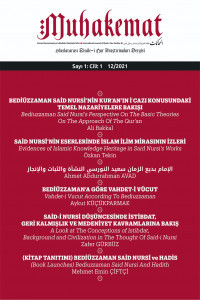SAİD-İ NURSİ DÜŞÜNCESİNDE İSTİBDAT, GERİ KALMIŞLIK VE MEDENİYET KAVRAMLARINA BAKIŞ
İstibdat, Meşrutiyet, Cumhuriyet ve çok partili hayat dönemlerini yaşamış bir Osmanlı münevveri olan Said-i Nursi gerek yazdıkları ve gerekse söyledikleriyle pek çok insanı etkilemiş bir düşünce ve eylem adamıdır. Günümüzde de yazdığı Risale-i Nur isimli hacimli külliyat pek çok kişi tarafından okunmaktadır. Said’in kainat ve insanla kurduğu ilişkide temel meselesi imanın yeniden ihyasıdır. Ancak imanı salt içe dönük, dünyadan azade ve apolitik bir yaşam biçimi olarak görmemiştir. İman ile toplumsal ve siyasal meseleler arasında çok güçlü bir bağ olduğunu ileri sürmüştür. İnandığı dini, bir hayat nizamı olarak idrak eden insanın içinde yaşadığı medeniyet anlayışına nasıl yaklaşması gerektiği, onu yöneten siyasal iradenin mahiyetini ve inançlarının dünyayla ilişkilerinde sınırlarının ne olduğu Said’in ilgilendiği meseleler arasındadır. Buradan hareketle, çalışma içinde İslamcıların modernleşme hakkındaki düşünceleri ifade edilecek ve içinde bulundukları halet-i ruhiye tasvir edilmeye çalışılacaktır. Akabinde, dönemin önemli münevverlerinden Said’in dönemin temel tartışma konuları hakkındaki fikirlerine kısaca değinilerek geri kalma, istibdat ve medeniyet kavramlarını nasıl anladığı ele alınacaktır.
Anahtar Kelimeler:
: İstibdat, Medeniyet, Siyaset, Geri Kalma, Said-i Nursi
A Look at The Conceptions of Istibdat, Background and Civilization in The Thought Of Said-i Nursi
Said-i Nursi, an Ottoman intellectual who lived through the Political Oppression, Constitutional Monarchy, Republic and multi-party life periods, is a man of thought and action who influenced many people with his writings and words. Today, his voluminous corpus called Risale-i Nur has been read by many people. The main issue of Said in his relationship with the universe and man is the rejuvenatıon of faith. However, he did not see faith as a purely isolated, mundane and apolitical way of life. He argued that there is a very strong link between faith and social and political issues. The issues that Said deals with are how a person who understands the religion he believes in as a way of life should approach the understanding of civilization in which he lives, the nature of the political will that governs him, and what the limits of his beliefs are in their relations with the world. From this point of view, the thoughts of the Islamists about modernization will be expressed in the study and the state of mind they have will be tried to be described. Afterwards, it will be discussed how Said, one of the important intellectuals of the period, understood the concepts of backwardness, tyranny and civilization by briefly mentioning his ideas on the main discussion topics of the period.
Keywords:
Tyranny, Civilization, Politics, Backwardness, Said-i Nursi,
- Başlangıç: 2021
- Yayıncı: Hayatboyu Öğrenim ve İletişim Derneği
Sayıdaki Diğer Makaleler
Kitap Tanıtımı: BEDİÜZZAMAN SAİD NURSÎ ve HADİS
SAİD-İ NURSİ DÜŞÜNCESİNDE İSTİBDAT, GERİ KALMIŞLIK VE MEDENİYET KAVRAMLARINA BAKIŞ
İMAM BEDİÜZZAMAN SAİD NURSİ, DOĞUŞU, KARARLIĞI VE BAŞARISI
BEDİÜZZAMAN’A GÖRE VAHDET-İ VÜCÜD
BEDİÜZZAMAN SAİD NURSİ’NİN KUR’AN’IN İʻCAZI KONUSUNDAKİ TEMEL NAZARİYELERE BAKIŞI
